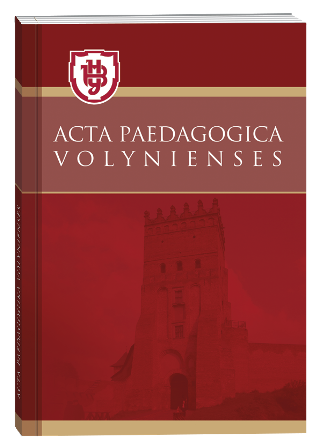DIRECTIONS OF DEVELOPMENT OF DIALOGIC SPEECH OF SENIOR PRESCHOOLERS WITH INTELLECTUAL DISABILITIES IN THE CONDITIONS OF SUBJECT-PRACTICAL AND GAME ACTIVITIES
DOI:
https://doi.org/10.32782/apv/2022.6.10Keywords:
children with intellectual disabilities, senior preschoolers, dialogic speech, subject-practical activity, game activityAbstract
The article deals with the directions of development of dialogic speech for senior preschoolers with intellectual disabilities. It is noted that the dialogic speech of senior preschool children with intellectual disabilities is characterized by a number of features – low activity and initiative, limited life experience, low level of understanding of what they hear due to lack of thinking, low motivation to speak and interact, lack of speech due to the poverty of active vocabulary and unformed grammatical side of speech, avoidance of dialogue, confusion of speech and others. It is determined, that the violation of dialogic speech in senior preschoolers with intellectual disabilities negatively affects the entire mental development of the child, affects his/her activity, behavior, manifests itself in the unformed means of communication, prevents the implementation of full communication, negatively affects the establishment and maintenance of contacts with peers. It is emphasized that the priority direction of the development of coherent dialogic speech of preschoolers is the implementation of a communicative-activity approach to teaching children, which is ensured under the following conditions: the activity nature of the organization of the process of mastering speech means, the implementation of speech development in subject-practical and game activities. It is researched, that correctional and developmental work with older preschoolers with intellectual disabilities should take place in the conditions of subject-practical and game activities using communicative methods - conversation, talk, polylogue; various types of productive activities – drawing, modeling, application, design, work; role-playing and didactic games; art therapy method - fairy tale therapy, theatricalization of creating and playing fairy tales. The types of activities of senior preschoolers with intellectual disabilities for enriching the content of speech education and improving the forms and methods of speech work are described; for the formation of the ability to listen and hear a partner, to support speech and game interaction, to respond to the partner's statements, to reflect, to argue statements; to increase the game and communicative motivation for classes; to form the ability to complement the partner's statements: ask questions, politely express assumptions, wishes, disagreement; reason, justify their reasoning.
References
Бабич Н. М. Методика дослідження стану сформованості комунікативних навичок у дітей дошкільного віку з порушеннями зору та інтелекту. Освіта осіб з особливими потребами: шляхи розбудови: зб. наук. праць. Київ, 2014. Вип. 6. С. 25–29.
Богуш А. М. Мовленнєвий компонент дошкільної освіти. Х.: Вид-во «Ранок», 2011. 176 с.
Задорожня В. С. Розвиток діалогічного мовлення з ЗНМ. URL: https://vseosvita.ua/library/rozvitok-dialogicnogo-movlennadoskilnikiv-z-znm-115882.html (дата звернення 13.10.2022).
Каніщенко А. П. Уроки розвитку зв’язного мовлення в початкових класах :методичний посібник для вчителя. К. : Рута, 2000. 128 с.
Кашуба Л. В. Мовленнєво-комунікативний розвиток молодших школярів із ЗПР засобами ейдетичних методик. Дидактичні та соціально-психологічні аспекти корекційної роботи у спеціальній школі : наук.-метод. зб. / за ред. В. І. Бондарь, В. В. Засенко. Київ., 2005. Вип. 6. С. 123–127.
Кравець Н. П. Розвиток мовлення розумово відсталих учнів на уроках читання. Логопедія. 2012. № 2. С. 35–40.
Малашевич Т. В., Зелінська-Любченко К. О. Особливості комунікативних умінь та шляхи їх формування у молодших школярів із порушеннями інтелекту. Сучасні проблеми логопедії та реабілітації. Суми, 2017. С. 85–88.
Методика розвитку рідної мови і ознайомлення з навколишнім у дошкільному закладі : навч. посібник / А. М. Богуш, Н. П. Орланова, Н. І. Зеленко, В. К. Лихолєтова ; за ред. А. М. Богуш. К.: Вища школа, 1992. 414 с.
Потамошнєва О. Навчання навичок міжособистісного спілкування розумово відсталих дітей. Дефектологія. 2003. № 3. С. 24–26.
Синьов В. М., Матвєєва М. П., Хохліна О. П. Психологія розумово відсталої дитини. К. : Знання, 2008. 359 с.
Тубичко Ю. О. Розвиток діалогічного мовлення дітей старшого дошкільного віку з помірною розумовою відсталістю. Науковий часопис. Серія 5. Педагогічні науки: реалії та перспективи : зб. наук. пр. / М-во освіти і науки України, Нац. пед. ун-т імені М. П. Драгоманова. Вип. 83. Київ : Видавничий дім «Гельветика», 2021. 266 с.
Хохліна О. П. Виготський Л. С. Про розвиток розумово відсталих дітей. Педагогіка і психологія. 1997. № 2 (15). С. 186–193.







